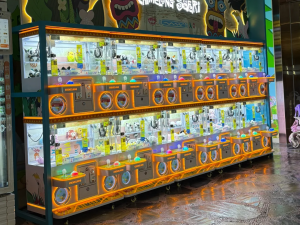Vending machines have become an integral part of modern life. It offer convenience and accessibility to consumers across a wide range of products. As technology continues to advance at a rapid pace, there are exciting advancements in the future of vending machines. Here are some key trends shaping the future of self-service vending machines:

1. Integration of Artificial Intelligence (AI):
Artificial intelligence is set to revolutionize the capabilities of vending machines. AI-driven algorithms will enable machines to analyze consumer behavior, preferences and trends in realtime. This provides personalized recommendations and promotions. By leveraging artificial intelligence, vending machines can optimize product selection and pricing strategies. It can better meet the needs of individual customers and maximize revenue.
2. Enhanced User Interfaces:
The user interface of self-service vending machines is evolving to provide a more intuitive and engaging experience. Touch screens, voice recognition and gesture controls are part of the integrated technology. They enable a more seamless and user-friendly interaction with vending machines. Additionally, combining reality (AR) and virtual reality (VR) elements. It will enhance product visualization and customization options.
3. Cashless and Contactless Payments:
The rise of digital payments and the growing preference for contactless transactions. Cashless payment options will continue to be available at vending machines. Mobile wallets, NFC technology, and QR codes will become standard features. They will offer consumers a secure and convenient way to make purchases. In addition, the use of blockchain technology can enhance the transparency and security of transactions. In particular, in vending machines that offer high-value items or services.
4. Sustainability Initiatives:
As environmental concerns become more pressing, vending machines will play a role in promoting sustainability. Vending machines equipped with recycling capabilities will encourage responsible disposal of packaging materials . But eco-friendly alternatives such as biodegradable packaging and refillable containers will reduce waste. Additionally, the vending machines utilize solar panels and energy-saving components to minimize their carbon footprint.
5. Expansion into New Markets:
Vending machines are no longer limited to traditional retail settings. The future will see the proliferation of vending machines in emerging markets such as healthcare, hospitality, and transportation. In hospitals and clinics, vending machines may dispense medical supplies, prescription medications, and personal protective equipment. In hotels and airports, vending machines could offer travel essentials, toiletries, and souvenirs. Autonomous vending machines may even be deployed in autonomous vehicles. And it can provide passengers with on-the-go snacks and refreshments.
6. Remote Monitoring and Maintenance:
The adoption of Internet of Things (IoT) technology will enable remote monitoring and maintenance of vending machine. It can reduce downtime and enhancing operational efficiency. Sensors embedded within machines will collect data on inventory levels, temperature, and performance metrics . It allow operators to proactively address issues and restock supplies as needed. Predictive analytics algorithms will help optimize routes for restocking and servicing. And it also minimize travel time and fuel consumption.
To sum up, the future characteristics of vending machines are innovation, convenience and sustainability. Leverage advanced technologies such as artificial intelligence, cashless payments and IoT connectivity. Vending machines will continue to evolve to meet the changing needs and expectations of consumers. From personalized recommendations to the development of environmentally friendly initiatives. The vending machines of the future will redefine convenience in ways we can’t even imagine.




